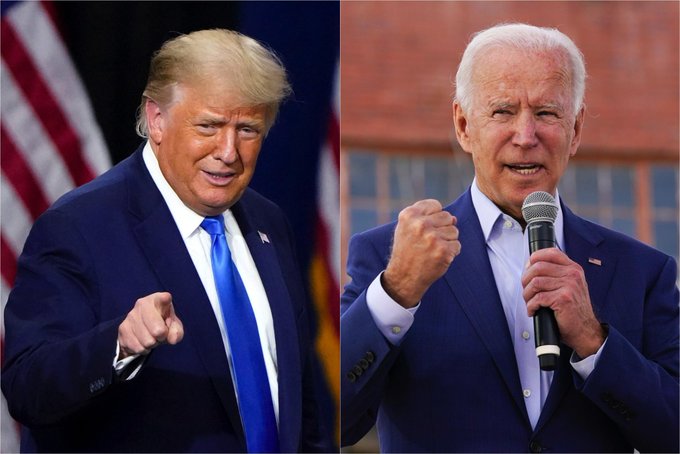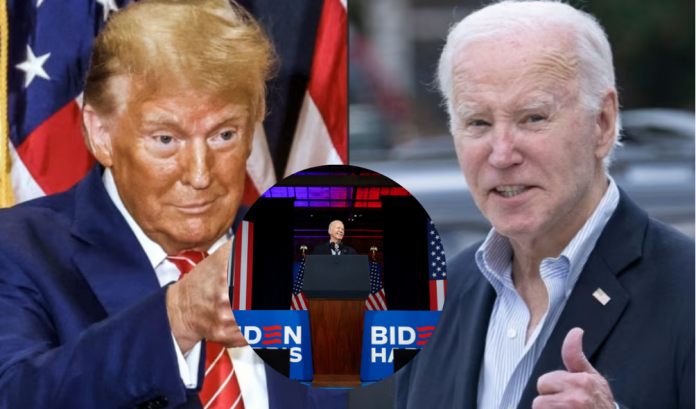The 2024 presidential election marks a significant historical moment in the United States, as it is the first presidential rematch since 1956, where the incumbent president, Joe Biden, faces his immediate predecessor, Donald Trump. This election not only sets a precedent for future political contests but also reflects on the broader political landscape and the dynamics of the American electorate.
The last presidential rematch occurred in 1956, when Dwight D. Eisenhower, the Republican President, defeated Adlai Stevenson, his Democratic opponent from four years prior, in a landslide victory. This rematch was not only a political event but also a reflection of the political climate and the candidates’ strategies at the time. The 2024 rematch, however, is set against a backdrop of a deeply polarized nation, with significant differences in political ideologies, policy preferences, and the candidates’ personal histories.

Historically, there have been other instances of presidential rematches, albeit much earlier in U.S. history. For example, William McKinley and William Jennings Bryan faced each other twice, with McKinley winning both times. Similarly, John Quincy Adams and Andrew Jackson, John Adams and Thomas Jefferson, and Grover Cleveland all had their own rematches, each with its unique set of circumstances and outcomes. These historical precedents provide a context for understanding the dynamics of the 2024 rematch, including the challenges and opportunities that each candidate may face.
The 2024 election is also notable for being the first rematch between a current and a former president since 1892, highlighting the changing nature of presidential politics and the evolving roles of former presidents in the political landscape. Grover Cleveland, the only president to serve two non-consecutive terms, is a historical precedent for Trump’s attempt to win back the White House from his predecessor.
The dynamics of the 2024 rematch are further complicated by the current political climate, with polls indicating a close race between Biden and Trump. The election is expected to be closely contested, with both candidates likely to focus on key issues such as the economy and immigration, which are seen as the top problems facing the country. The outcome of the election will not only determine the future direction of U.S. politics but also have implications for the country’s domestic and international policies.
The Biden alliance consisting of politically correct sheep with coastal degrees, federal bureaucrats, the deep state, androids in Big Tech and the insecure media are going to run this election like a military campaign. This 2024 rematch Trump vs Biden will be an all-out war by… pic.twitter.com/d3v9RdL0Zq
— Jesse Watters (@JesseBWatters) March 7, 2024
The 2024 presidential rematch between Biden and Trump represents a significant milestone in U.S. political history, reflecting on the evolving nature of presidential politics and the challenges and opportunities that each candidate may face. The election is expected to be closely contested, with both candidates likely to focus on key issues such as the economy and immigration. The outcome of the election will have far-reaching implications for the future of U.S. politics and the country’s domestic and international policies.
Impact of Presidential Rematches on Political Landscape and Ex-President Roles
Previous presidential rematches have significantly impacted the political landscape and the roles of former presidents in various ways. These rematches have not only shaped the political narrative of the time but also influenced the strategies and approaches of candidates and their parties.
Historically, presidential rematches have been rare, with only a few instances occurring in U.S. history. The most recent rematch was in 1956, when Dwight D. Eisenhower defeated Adlai Stevenson, his opponent from four years prior, in a landslide victory. This rematch was notable for its political significance, reflecting the political climate and the candidates’ strategies at the time.
The role of former presidents in rematches has evolved over time. Grover Cleveland, the 22nd and 24th president, is the only president in U.S. history to serve two non-consecutive terms. His successful attempt to win back the White House from his opponent, Benjamin Harrison, set a precedent for future rematches. This highlights the changing nature of presidential politics and the evolving roles of former presidents in the political landscape.
Other former presidents have attempted to reclaim the White House with varying degrees of success. For example, Ulysses S. Grant sought the Republican nomination again in 1880 but lost to James A. Garfield. Similarly, Teddy Roosevelt, a Republican, ran for president on his own Progressive ticket in 1912, coming in second to Democrat Woodrow Wilson. These instances demonstrate the challenges and opportunities that former presidents face in attempting to return to the White House.

The rematch between Joe Biden and Donald Trump in 2024 marks the first presidential rematch since 1956, setting a new precedent in U.S. political history. This election is expected to be closely contested, with both candidates likely to focus on key issues such as the economy and immigration. The outcome of the election will not only determine the future direction of U.S. politics but also have implications for the country’s domestic and international policies.
Presidential rematches have historically played a significant role in shaping the political landscape and the roles of former presidents. These rematches reflect on the evolving nature of presidential politics and the challenges and opportunities that each candidate may face. The 2024 rematch between Biden and Trump represents a significant milestone in U.S. political history, with far-reaching implications for the future of U.S. politics and the country’s domestic and international policies.
How have presidential rematches affected public perception of former presidents?
Presidential rematches have historically influenced public perception of former presidents in various ways, shaping their legacy and the narrative surrounding their political careers. These rematches often reflect broader political dynamics, including the polarization of the electorate and the strategies employed by candidates and their parties.
One of the key impacts of presidential rematches on public perception is the reinforcement of political narratives and the amplification of the candidates’ personal brands. For instance, the rematch between Dwight D. Eisenhower and Adlai Stevenson in 1952 and 1956 highlighted the contrasting political ideologies and personalities of the two candidates, with Eisenhower’s victory being attributed to his strong leadership and Stevenson’s defeat to his liberal stance.
The rematch between Grover Cleveland and Benjamin Harrison in 1888 and 1892 showcased the enduring impact of political rivalries and the desire for revenge. Cleveland’s successful comeback, following his initial defeat, was partly driven by the sentiment of “we’ll be back,” reflecting a desire for political redemption and a critique of the political system. This sentiment resonated with the public and influenced the perception of both candidates.
The rematch between John Quincy Adams and Andrew Jackson in 1824 and 1828, as well as between William McKinley and William Jennings Bryan in 1896 and 1900, underscored the importance of political revenge and the perception of electoral fraud. These rematches highlighted the deep divisions within the electorate and the enduring impact of past elections on future contests. The narrative of electoral theft and the desire for revenge influenced public perception and shaped the political landscape.

The rematch between John Adams and Thomas Jefferson in 1796 and 1800, the first competitive presidential election following George Washington’s presidency, revealed constitutional flaws and led to the ratification of the 12th Amendment. This rematch influenced the perception of the electoral process and the importance of electoral reform, shaping the political discourse and the public’s understanding of the presidency.
In the context of the 2024 rematch between Joe Biden and Donald Trump, the public perception of both candidates will likely be influenced by the broader political climate, including the polarization of the electorate and the strategies employed by their campaigns. The rematch will not only reflect on the candidates’ political careers but also on the evolving nature of presidential politics and the public’s perception of the presidency itself.
In conclusion, presidential rematches have historically played a significant role in shaping public perception of former presidents, reflecting on the political narratives, personal brands, and the broader political landscape. The 2024 rematch between Biden and Trump is expected to continue this trend, influencing the public’s perception of both candidates and the presidency itself.
Don’t miss | Fatal Capsizing: 2 Dead And 24 Missing in Indonesia Boat Incident

